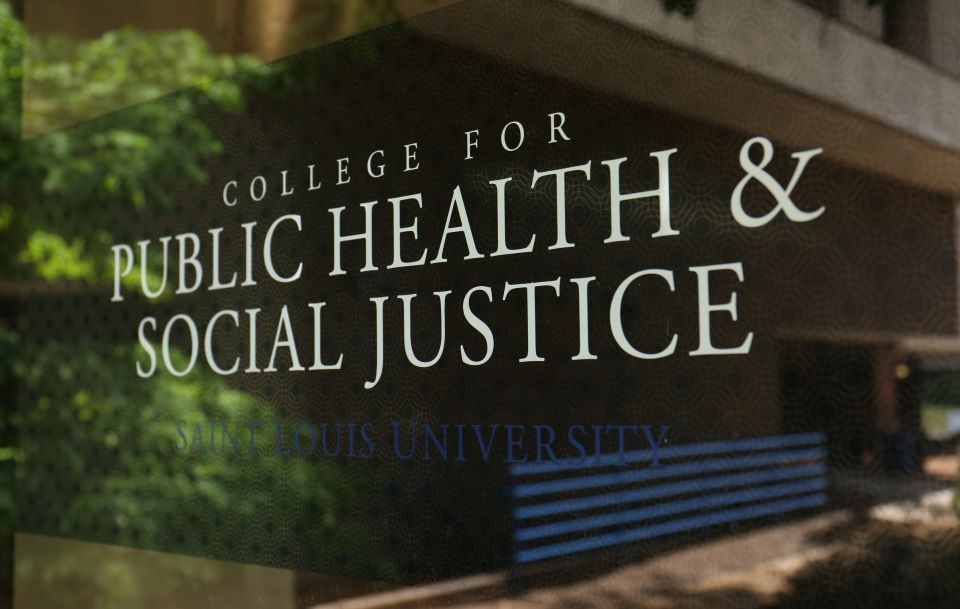SLU Expands Partnership with St. Louis County in Response to Rising COVID-19 Pandemic
Maggie Rotermund
Senior Media Relations Specialist
maggie.rotermund@slu.edu
314-977-8018
Reserved for members of the media.
11/23/2020
ST. LOUIS, MO – With rapidly increasing cases and hospitalizations in the region, Saint Louis University is partnering with the St. Louis County Department of Public Health to strengthen COVID-19 transmission tracking and research in the St. Louis area.
Utilizing $600,000 of CARES Act funding, SLU’s College for Public Health and Social Justice (CPHSJ) is expanding its existing partnership with the County Department of Public Health in response to the public health emergency. CPHSJ has the only academic health department in Missouri that creates a bridge between City and County Health Departments and the public health expertise at SLU.
“We are at a critical moment in our region,” said Tom Burroughs, Ph.D., dean of the College for Public Health and Social Justice. “It’s all hands-on deck to do everything we can to support our health departments and health system. In addition to helping our region through this crisis, it provides students with hands-on experience dealing with a public health crisis.”
As part of the partnership, CPHSJ is providing faculty and student support in the areas of epidemiology, biostatistics, data science, geospatial analysis, behavioral science and health communication. This will help better target the response and free-up DPH personnel to concentrate on the day-to-day operations of their respective teams.
“Our health care systems are quickly approaching the situation where facilities and personnel do not have the capacity to care for all of the COVID-positive patients,” said Alex Garza, M.D., incident commander of St. Louis Metropolitan Pandemic Task Force. “The person-power and expertise the University can provide critical relief and support at a time that it is most desperately needed.”
SLU experts are working to support the case investigation and contact tracing process by analyzing data, revising training, and technology efforts to increase the county’s bandwidth. Another group of experts from SLU are developing and testing vaccine promotion information. SLU experts will also provide extensive epidemiology and geospatial analytics to rapidly identify hot-spots and trends geographically.
“SLU has proven to be an excellent partner for us even before the pandemic,” said County Executive Sam Page, M.D. “Now we look forward to an even deeper relationship.”
The departments of CPHSJ and Computer Science (CS) have developed
Researchers from CPHSJ and SLU’s Department of Computer Science have developed the My CoVID-19 Symptom Tracker to monitor real-time symptoms and the location of symptomatic individuals while providing geolocated health care facilities near participants. Led by Enbal Shacham, Ph.D., professor of behavioral science and health education, and Flavio Esposito, Ph.D., assistant professor of computer science, the app will utilize real-time data to track symptoms and locations to best understand the areas and populations most affected by COVID-19. In partnership with the County, the app will help public health officials better determine the context in which individuals and communities may be at higher risk for COVID-19 infection.
“Using technology to identify where, when, and who is impacted by COVID-19 is imperative so that we can respond to the needs of our community members in real-time,” said Shacham. “We are happy to have developed a tool that is useful and can support the work of this health department, as well as the opportunity to help others.”
Shacham and her team also work with the St Louis Metropolitan Pandemic Task Force in studying the impact of COVID-19 mitigation policies on infection rates. The most recent of these studies released this week identifying that mask mandates reduce new infection rates by 44% over a three-week period.
SLU students are also heavily involved in the success of this project. They are providing additional support by serving as contact tracers and case investigators to expand the bandwidth of DPH personnel. They undergo rigorous training, including online and in-person classes, role playing, HIPAA training, familiarization with Sunshine requests, de-escalation exercises, quality assurance reviews and case interview techniques.
Other faculty members assisting with this partnership include:
- Rachel Charney, M.D., professor of pediatrics, and Kristin Wilson, Ph.D., associate professor of health policy and education, are leading the contact tracing and case investigation training
- Jen Jen Chang, Ph.D., associate professor of epidemiology; Lauren Arnold, Ph.D., associate professor of epidemiology; and Steve Rigdon, Ph.D., professor of epidemiology and biostatistics; are leading epidemiological and analytic support
- Ricardo Wray, Ph.D., professor of behavioral science and health education, is leading vaccine adoption research and message development
- Darcy Scharff, Ph.D., associate professor of behavioral science and health education, and Pamela Xaverius, Ph.D., associate professor of epidemiology, are leading CPHSJ student support and community initiatives.
College for Public Health and Social Justice
The Saint Louis University College for Public Health and Social Justice is the only academic unit of its kind, studying social, environmental and physical influences that together determine the health and well-being of people and communities. It also is the only accredited school or college of public health among nearly 250 Catholic institutions of higher education in the United States.
Guided by a mission of social justice and focused on finding innovative and collaborative solutions for complex health problems, the College offers nationally recognized programs in public health, social work, health administration, applied behavior analysis, criminology and criminal justice.
Saint Louis University
Founded in 1818, Saint Louis University is one of the nation’s oldest and most prestigious Catholic institutions. Rooted in Jesuit values and its pioneering history as the first university west of the Mississippi River, SLU offers more than 12,000 students a rigorous, transformative education of the whole person. At the core of the University’s diverse community of scholars is SLU’s service-focused mission, which challenges and prepares students to make the world a better, more just place.


















